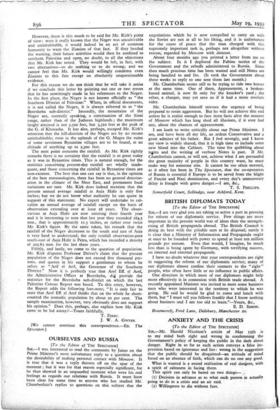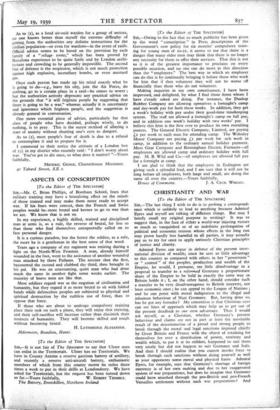ANXIETY AND THE CRISIS
[To the Editor of THE SPECTATOR] SIR,—Mr. Harold Nicolson's article of May 12th is
to my mind both right and wrong in condemning the Government's policy of keeping the public in the dark about danger. Right in so far as such action conveys a false im- pression based on ignorance and lies: wrong in the suggestion that the public should be disquieted—an attitude of mind based on an absence of faith, which can do no one any good. What is wanted is a sound realisation of real dangers, with a spirit of calmness in facing them.
This spirit can only be based on two things—
(I) Decision in advance as to what each person is actually going to do in a crisis and an air raid.
(2) Willingness to die without fuss.
As to (I), as a head air-raid warden for a group of sectors, no one knows better than myself the extreme difficulty of getting from the authorities any definite instructions for the civilian population—or even for wardens—in the event of raids. Official advice seems to be based on the provision by each family of a "refuge room," which has been proved by Barcelona experience to be quite futile and by London archi- tecture and crowding to be generally impossible. The second line of defence is the respirator, which is not much protection against high explosive, incendiary bombs, or even mustard gas.
Once each person has made up his mind exactly what he is going to do—e.g., leave his city, join the Air Force, do nothing, go to a certain place in a raid—he ceases to worry ; but the authorities actively deprecate any practical advice on the grounds that "it will frighten people by suggesting that there is going to be a war," whereas actually it is uncertainty and ignorance which frighten people, and the suggestion is already general in conversation.
One more essential piece of advice, particularly for that class of people who have decided, perhaps wisely, to do nothing, is to pray. This is the surest method of allaying a state of anxiety without shutting one's eyes to dangers.
As to (2), most people's fear of death is due to a refusal to contemplate it and to prepare for it.
I commend to their notice the attitude of a London boy of 151 in my district who recently said: "I don't worry about war. You've got to die once, so what does it matter? "—Yours faithfully,



















































 Previous page
Previous page